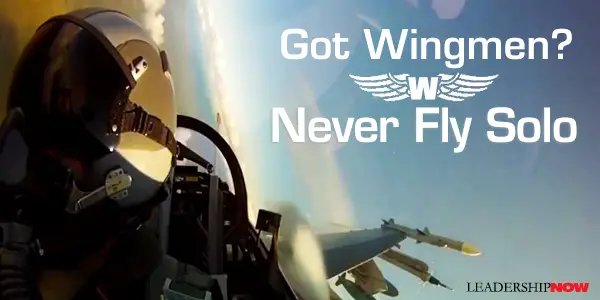 |
 |
12.07.09

Got Wingmen? Never Fly Solo
AIR FORCE fighter pilot Rob “Waldo” Waldman learned how to overcome fear, anxiety, and self-doubt to fly combat missions that pushed him to his limits by disciplined training and the help of his wingmen. Wingmen are people with different backgrounds, skills, and experiences unified under one agreement—to never think or act alone. A wingman watches your back. In Never Fly Solo, Waldo threads real-world experiences to encourage the development of a check-six culture. Check-six refers to the six o’clock position where the jet is most vulnerable—the pilot’s blind spot. Waldo says, “There is a limit to how much you can learn on your own. A good wingman will give you mission-critical feedback, catch your errors, ask questions, and propose challenging scenarios to push you to grow in your skills and mental discipline.” Encouraging others to look out for our blind spots requires a great deal of mutual trust. “These trusted partners, male or female, are your wingmen.” Of course, this means first, not being afraid to acknowledge that you need help and then being able to ask for it. This is all the more difficult if you haven’t built trust in yourself and invested the time to build trusting relationships with others. You’ve got to “walk the flight line.” Get out and build relationships with those people you work with—treating each other as people first and coworkers second. “It’s the relationships we build and the people whom we trust that give us the courage to take risks and make ourselves better.” By being willing to say, “I don’t know,” or “I messed up,” we create a transparency that will attract others to us and “create the type of environment where people won’t be afraid to make mistakes. They will also be more likely to check your six as well.”Additionally, we have to keep our “radar sweeping for a wingman, coworker, or peer who may be experiencing a challenging time in her life. Don’t let her get isolated.” Be supportive and find her some help if necessary.” It is the worker that keeps to themselves—trying to fly solo—that check out, become unmotivated, complacent and careless. “Never feeling invested in the company’s mission, they do the minimum, and everyone suffers.” In today’s environment, communication, feedback, and mutual support are critical Waldo says because:
“An effective check-six environment frees up communication and removes barriers to growth so that all members of the team feel empowered to speak up and ask questions.” It also builds team confidence. We all need wingmen and the best way to find a wingman is to be one! 
Posted by Michael McKinney at 07:29 AM
|
BUILD YOUR KNOWLEDGE
 

How to Do Your Start-Up Right STRAIGHT TALK FOR START-UPS 
Grow Your Leadership Skills NEW AND UPCOMING LEADERSHIP BOOKS 
Leadership Minute BITE-SIZE CONCEPTS YOU CAN CHEW ON 
Classic Leadership Books BOOKS TO READ BEFORE YOU LEAD |